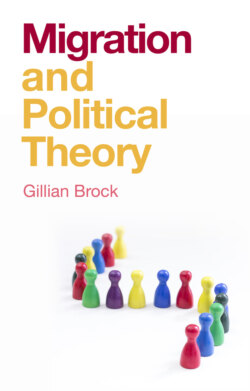Читать книгу Migration and Political Theory - Gillian Brock - Страница 22
2.2.2 Freedom (again)
ОглавлениеMany theorists have developed all of the main themes we find in Carens’s influential arguments. Let’s start with the argument from concern for freedom. We see how authors have significantly developed this line of argument in ways that both support and challenge Carens’s original line of argument.
There are many freedom-centered arguments for open borders. These often start from the premise that in order for people to pursue their life plans, they must be able to cross borders. For instance, to pursue religious, cultural, or career goals, one needs the freedom to move to where these opportunities can be enjoyed, if they cannot be pursued within the bounds of a person’s state (Carens 1987; Cole 2000; Oberman 2013).
But there are challenges to this line of argument. David Miller argues that freedom does not require completely open borders and unlimited options. Rather, if there is a sufficient range of options, crossing borders cannot be justified using such arguments (Miller 2005, 2007). Freedom of movement should be a basic liberty because of the ways in which it protects individuals’ freedoms to pursue life projects from an adequate range of valuable options. When our state of residence provides these options, our freedom of movement cannot justify the freedom to cross borders (Miller 2005, 2007). Of course, many of those who would like to cross borders do so precisely because their states fail to provide the relevant options, so this argument may not be sufficient to block much real-world migration.
To illustrate some different concerns related to freedom, consider the libertarian argument that Carens introduces. The libertarian version of the argument often starts with claims about the importance of associational freedom or freedom to contract. Suppose a farmer in Arizona needs workers and someone from Mexico is prepared to do this work. If the state prohibits the farmer from contracting with the Mexican worker, it is interfering with the free choices of consenting adults and also violating their freedom to contract. Is the libertarian argument persuasive?
Insofar as the arrangements impose costs on others not party to the transaction, those negatively affected might reasonably complain. Some costs may not be germane – the freedom to be protected from competition might be one (Carens 1987). But others might be relevant. Insofar as such arrangements put downward pressure on compatriots’ wages, such that they can no longer meet their basic needs, such situations could be relevant to whether the transaction is permissible, someone might argue (e.g. Song 2019).
Similarly, freedom of movement across borders might be constrained by parallel reasoning. Some may be concerned that high numbers of migrants will affect a state’s capacities to maintain security or protect civil rights. Some also worry that large numbers of culturally diverse immigrants would also present integration challenges and threaten civil liberties (Kymlicka 2001). Authors have different assessments of the level of immigration that could be supported that avoids these effects, and here empirical considerations are certainly relevant. Empirical evidence across countries varies greatly and so might well support different conclusions for particular contexts. We return to some of these themes in later chapters (such as chapters 4, 5, 7 and 8).
